- Home
- slideshows
- miscellaneous
- The average large company dies at age 30 - Here are 4 strategies Jeff Bezos uses to make sure Amazon isn't one of them
The average large company dies at age 30 - Here are 4 strategies Jeff Bezos uses to make sure Amazon isn't one of them
Imagine if your CEO stood in front of your company and said, "We're going to die." That's what Jeff Bezos has done over and over again.

It turns out companies are dying younger than ever. The average US public company only lives to be about 30 years old.
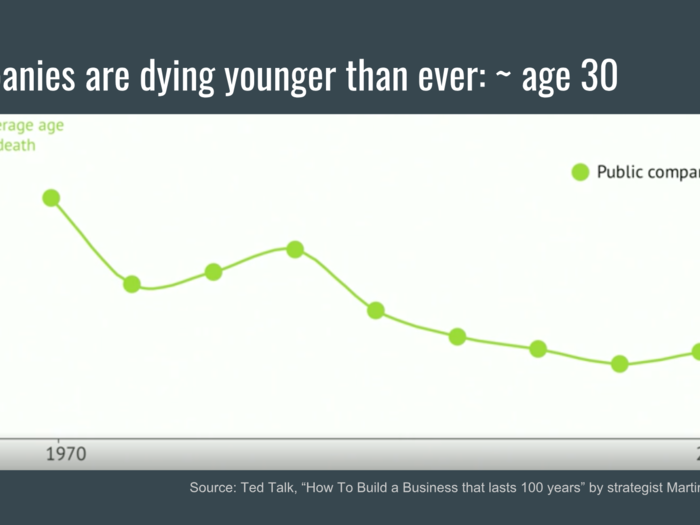
Perhaps more startling: 32% of companies won't exist five years from now, according to strategist Martin Reeves, who gave a TED Talk on how to build a 100-year-old company.
So, how do you delay a company's inevitable death? Jeff Bezos' answer:
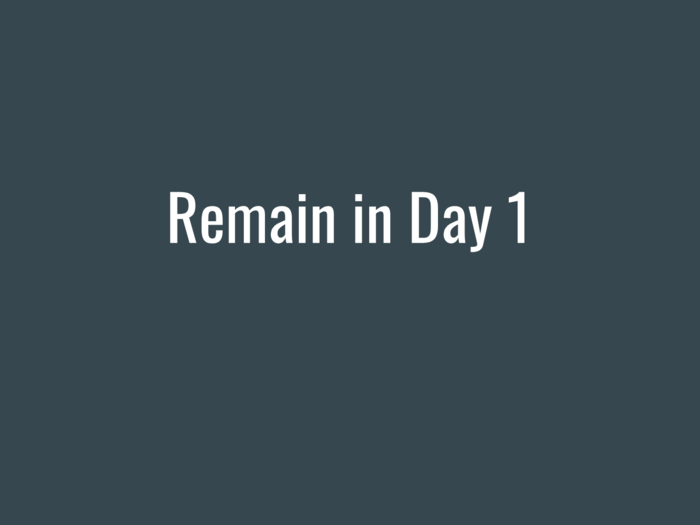
Bezos has been talking about Day 1 for decades. He works in a building on Amazon's headquarters called "Day 1."
Today, he signs his shareholder letters with, "It remains Day 1."
"Day 1" is the innovation and growth phase of a company.
What's Day 2?
If you're a CEO, you don't want to find out.
Bezos uses four strategies to "remain in Day 1." The first is to delight customers.
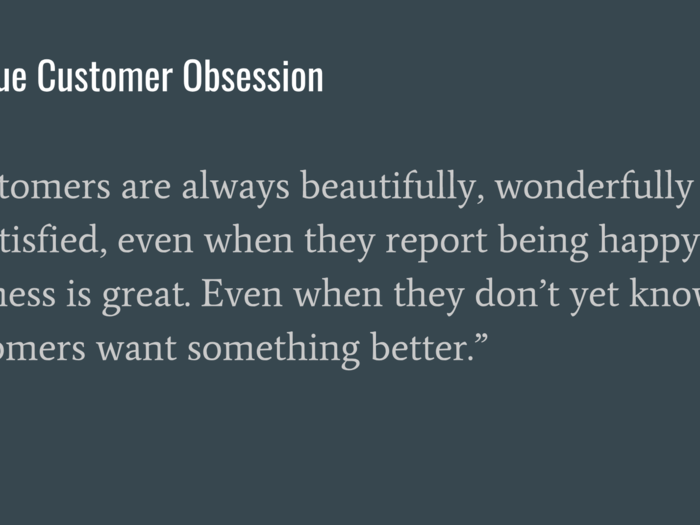
Bezos believes that if you're truly obsessed with pleasing your customers, you will come up with innovations that they will love, that they never could have articulated.
"No customer ever asked Amazon to create the Prime membership program, but it sure turns out they wanted it, and I could give you many such examples," Bezos wrote in his 2017 shareholder letter.
This belief is popular among innovators. Apple cofounder Steve Jobs famously disliked focus groups. He felt people often didn't know what they wanted until you showed it to them.
The second strategy Bezos uses is to resist thinking, "We've always done it this way." Don't let your processes own you.
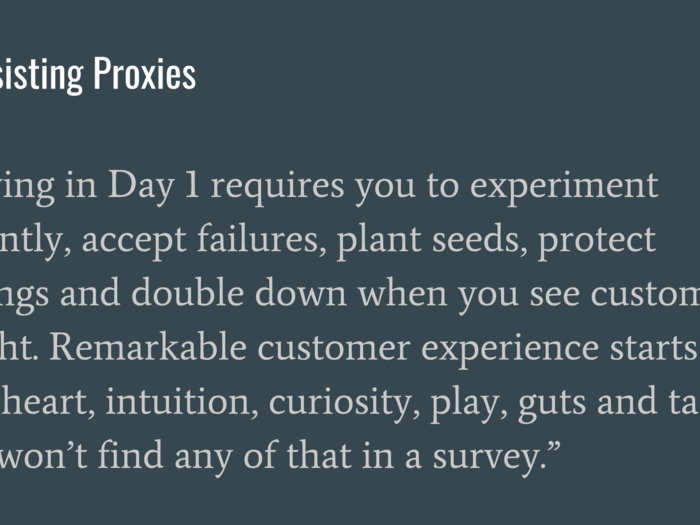
You should constantly be questioning whether or not there's a better way to do something, Bezos says.
"Good process serves you so you can serve customers. But if you’re not watchful, the process can become the thing. This can happen very easily in large organizations," Bezos wrote.
"You stop looking at outcomes and just make sure you’re doing the process right. Gulp... The process is not the thing. It’s always worth asking, do we own the process or does the process own us? In a Day 2 company, you might find it’s the second."
Trying to hold on to the way things were is also a bad strategy. Instead, you should notice what's happening in your industry and get on board.
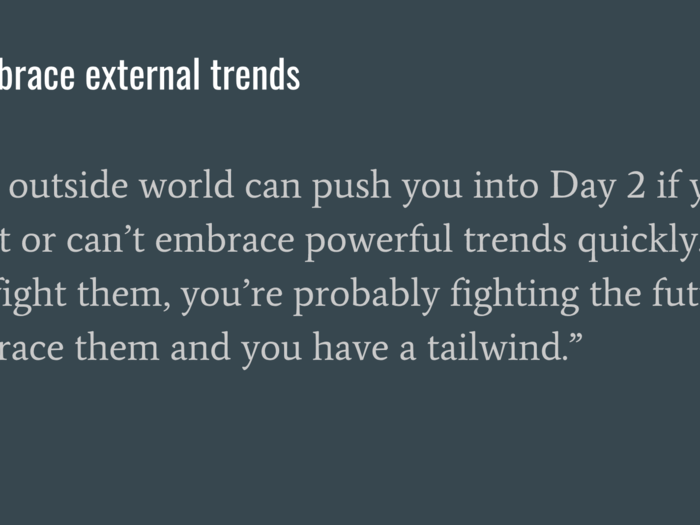
With the pace of technological change, no company can afford to hold on to the good old days and resist new trends.
It is better to disrupt yourself than to be disrupted. So if you notice things changing, get ahead of of it rather than resist it.
The final strategy Bezos recommends is to make decisions quickly. He uses a phrase with his leadership team, "disagree and commit" to help them get aligned on tough decisions.
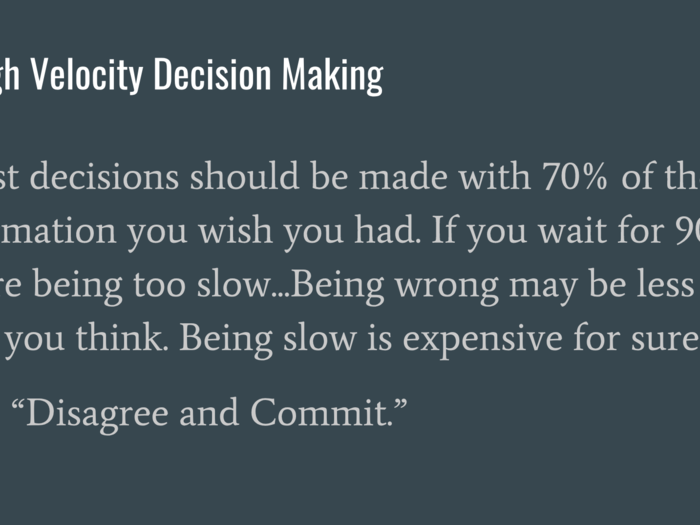
Ideally, a leader will feel 100% confident making a decision.
Unfortunately, this isn't practical. And if you wait until you feel 100% confident or have all of the information, the opportunity will likely have passed and you'll have moved too slowly.
Bezos points out that it's often not that damaging to be wrong. Failures can be scaled back if you realize your error and move quickly.
What happens when your leadership team disagrees on a way forward?
Bezos uses a phrase "disagree and commit" to save time. He uses this when a consensus with his team not be reached, and a decision needs to be made.
It is not, however, an ask for the team (or him) to cave. It is instead a promise to get aligned after healthy discourse so the entire company can move forward productively.
"It’s a genuine disagreement of opinion, a candid expression of my view, a chance for the team to weigh my view, and a quick, sincere commitment to go their way," Bezos says.
If you slip out of Day 1, you'll wind up in Day 2. And then, RIP!
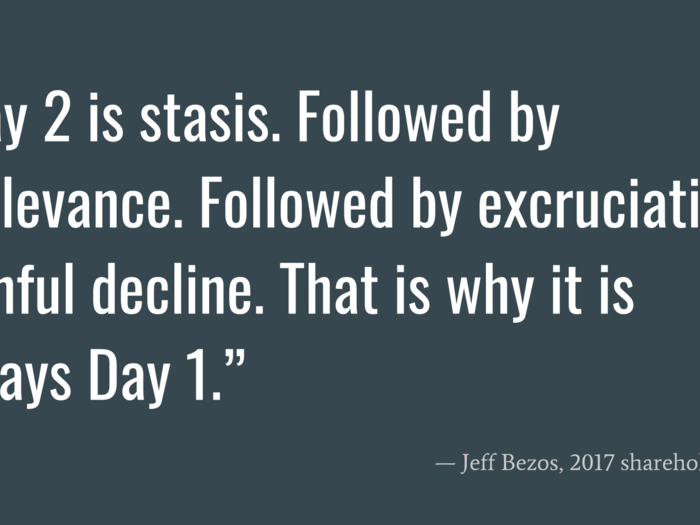
An Amazon employee asked Jeff Bezos what "Day 2" means.
Day 2 is the beginning of the end.
"To be sure, this kind of [company] decline would happen in extreme slow motion," Bezos explains of the Day 2 scenario.
"An established company might harvest Day 2 for decades, but the final result would still come."
Popular Right Now
Popular Keywords
Advertisement